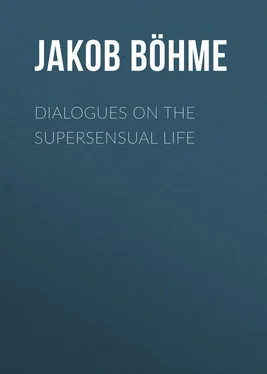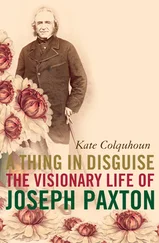Jakob Böhme - Dialogues on the Supersensual Life
Здесь есть возможность читать онлайн «Jakob Böhme - Dialogues on the Supersensual Life» — ознакомительный отрывок электронной книги совершенно бесплатно, а после прочтения отрывка купить полную версию. В некоторых случаях можно слушать аудио, скачать через торрент в формате fb2 и присутствует краткое содержание. ISBN: , Жанр: foreign_antique, foreign_prose, на английском языке. Описание произведения, (предисловие) а так же отзывы посетителей доступны на портале библиотеки ЛибКат.
- Название:Dialogues on the Supersensual Life
- Автор:
- Жанр:
- Год:неизвестен
- ISBN:http://www.gutenberg.org/ebooks/33742
- Рейтинг книги:4 / 5. Голосов: 1
-
Избранное:Добавить в избранное
- Отзывы:
-
Ваша оценка:
- 80
- 1
- 2
- 3
- 4
- 5
Dialogues on the Supersensual Life: краткое содержание, описание и аннотация
Предлагаем к чтению аннотацию, описание, краткое содержание или предисловие (зависит от того, что написал сам автор книги «Dialogues on the Supersensual Life»). Если вы не нашли необходимую информацию о книге — напишите в комментариях, мы постараемся отыскать её.
Dialogues on the Supersensual Life — читать онлайн ознакомительный отрывок
Ниже представлен текст книги, разбитый по страницам. Система сохранения места последней прочитанной страницы, позволяет с удобством читать онлайн бесплатно книгу «Dialogues on the Supersensual Life», без необходимости каждый раз заново искать на чём Вы остановились. Поставьте закладку, и сможете в любой момент перейти на страницу, на которой закончили чтение.
Интервал:
Закладка:
Between the year 1619 and his death in 1624, at the age of forty-nine, he poured forth his stored up thoughts, writing a number of Works, including those in the present volume, which were among his very latest. He had the more time to write because his shoemaking business had fallen off, by reason, perhaps, of the question as to his orthodoxy, but some friends supplied him with the necessaries of life. He was now exposed to fresh attacks from Gregorius Richter and was forced this time to go into exile. At this period he went to the Electoral Court at Dresden where the Prince was curious about him, and a conference took place between him and John Gerhard and other eminent theologians. At the close of this Dr Gerhard said: "I would not take the whole world and help to condemn this man." And his colleague Meissner said, "My good brother, neither would I. Who knows what stands behind this man? How can we judge what we have not understood? May God convert this man if he is in error. He is a man of marvellously high mental gifts who at present can neither be condemned nor approved."
Soon afterwards, while Jacob was staying at the house of one of his noble friends in Silesia he fell into a fever. At his own request he was carried back to Görlitz, and there awaited his end. On Sunday, November 21st 1624, in the early hours he called his son Tobias and asked him if he did not hear that sweet melodious music. As Tobias heard nothing, Jacob asked him to set wide the door so that he might the better hear it; then he asked what was the hour, and when he was told that it had just struck two he said, "My time is not yet; three hours hence is my time." After some silence he exclaimed, "Oh thou strong God of Sabaoth, deliver me according to thy Will," and immediately afterwards "Thou Crucified Lord Jesus Christ have mercy upon me and take me to thyself into thy Kingdom." At six in the morning he suddenly bade them farewell with a smile, and said, "Now I go hence into Paradise," and yielded up his Spirit.
Frankenberg writes of him: "His bodily appearance was somewhat mean; he was small of stature, had a low forehead but prominent temples, a rather aquiline nose, a scanty beard, grey eyes, sparkling into heavenly blue, a feeble but genial voice. He was modest in his bearing, unassuming in conversation, lowly in conduct, patient in suffering, and gentle-hearted."
As the shoemaker of Görlitz had in his life-time some disciples among highly educated men, so has he always had a few since his departure from this life. Men so diversely situated as the non-juror William Law in England; St Martin, the "philosophe inconnu" of the French Revolution; the sincere Catholic, Franz Baader, in Germany; Martensen, the Protestant Bishop in Denmark, have found in him their Teacher.
The selections contained in the present book belong rather to the practical or ethical side of Jacob Behmen's teaching than to his Cosmogony, or Vision , as one may best call it, of the nature of all things. I think that any old cottager, who had read nothing but his Bible, but had lived his life, would well understand the general teaching of most that is contained in these Dialogues, and would find all Behmen's words most beautiful and comforting. It is not, therefore, necessary for the present purpose to attempt fully to set forth the whole Vision of Behmen, nor, in any case would it be within my power to do so. But it may be of service to those readers who are not acquainted with the writings of Behmen or of his disciples, if I here say something as to his general teaching with regard to the nature of the soul of man and its relation to that which is not itself, but like to itself.
The Soul, in the doctrine of Behmen, is a Being which has a will or desire, and is aided by a mirror of understanding or imagination. Will or Desire is of the very essence of the Soul, inseparable from its existence. He says: "Where Desire is there is also Essence or Being." The Soul is subject to the diverse attractions of the Centre of Divine Life and Light, and of the Spirit of the World. Enlightened by its understanding it has the free power to turn its will towards, and unite itself to, this or that. "Choose well, thy choice is brief and yet endless."
The Soul is a magic Fire derived out of, or from, God the Father's Essence, lumen de lumine , and imprisoned in darkness. It is an intense and incessant Desire after the Light; it longs to return to the Light-centre, whence it originally came, that is, to the "heart of God." Thus longing, it is a "Fire of Anguish," until it becomes a "Fire of Love." It is a fire of anguish, so long as it is shut up in its dark self. It is a fire of love when it pierces through and escapes from its dark self-prison and burns freely and softly in union with the Divine Love. God then comes as a Light, a soft purifying Fire into the Soul, and changes all the wanting, hungering, empty, restless, self-tormenting properties of the Natural Life into a sweetness of rest and peace. This is called in Scripture the "new birth." Thus the same thing – the same Fire, – is a cause of torment or of joy according to the conditions under which it is. Man, who is a microcosm of the whole Universe, is a mingling of light and darkness. His anguish comes from his Soul's imprisonment in darkness (as a mere raging fire) and continues until it can break forth and unite itself with that whence it came and to which it belongs.
Behmen says "The Eternal Darkness of the Soul is Hell, viz.: an aching source of anguish, which is called the Anger of God, but the Eternal Light in the Soul is the Kingdom of Heaven, where the fiery anguish of darkness is turned into joy. For the same nature of anguish, which, in the Darkness, is a cause of sadness, is, in the Light, a cause of the outward and stirring joy… The Fire is painful and consuming, but the Light is yielding, friendly, powerful and delightful, a sweet and amiable Joy."
Pure delight, with no trace of doubt or fear, hope or regret, is the sign of the presence of Love or Light. So again Behmen says: "The Fire in the Light is a fire of Love, but the Fire in the Darkness is a fire of Anguish, and is painful, irksome, and full of contrariety." The end to which all things tend is the final separation of light from darkness; the "last day" means this; but the present world is a perpetual mixture of light and darkness, good and evil, joy and anguish. So, the Cross of Jesus is at once the highest embodiment of Love and Hate.
It is remarkable that in this doctrine of light and darkness Behmen was nearly followed by one who had not, I suppose, ever heard of him, reading as he did little of anything but the Bible, who worked on the Scriptures with his own powerful and earnest insight, the Christian hero, Charles Gordon. In his little book called "Reflections in Palestine" written in that one year, 1883, of unbroken repose from action spent in the Holy Land, just before his final service at Khartoom, Gordon dwells upon the repetition, as he calls it, both in the individual soul, and in the world's history of four processes constantly recurring, – a state of darkness, a light breaking forth through darkness, a division of light from darkness or gathering together of light, a re-dispersion of light into darkness, and then a renewal of the four processes, ever upon an ascending level of good, directed towards the final elimination of all light from the darkness.
Fire must have fuel, something on which to feed. It must feed or perish. But the magic Fire-spirit, the Soul, cannot perish because it is an eternal Essence. Therefore it must either feed; or hunger . It desires spiritual essence or "virtue" to allay its raging hunger. But, during the space that it is embodied in this nature, it can feed either on the Divine Spirit, or upon the Spirit of this World. "Hence," says Behmen, "we may understand the cause of that infinite variety which is in the Wills and Actions of Men." For of whatsoever the Soul eateth, and wherewith its Fire-life becometh kindled; "according to that the Soul's life is led and governed." You become like to that which you eat. If the Soul breaks forth out of its Nature-self and enters into "God's Love-fire," it eats of the Divine Essence (the substance or flesh of Christ) and it is to this that Jesus Christ referred when he spoke of feeding upon his body, and when he spoke of the true bread from heaven "which giveth life to the World" (John vi. 33), of which he that eateth shall "live for ever" (John vi. 58), or the "living water," whereof whosoever drinketh "shall never thirst," but it shall be to him "a well of water springing up into everlasting life" (John iv. 13, 14). This feeding is in no way metaphorical but as real and actual as physical feeding.
Читать дальшеИнтервал:
Закладка:
Похожие книги на «Dialogues on the Supersensual Life»
Представляем Вашему вниманию похожие книги на «Dialogues on the Supersensual Life» списком для выбора. Мы отобрали схожую по названию и смыслу литературу в надежде предоставить читателям больше вариантов отыскать новые, интересные, ещё непрочитанные произведения.
Обсуждение, отзывы о книге «Dialogues on the Supersensual Life» и просто собственные мнения читателей. Оставьте ваши комментарии, напишите, что Вы думаете о произведении, его смысле или главных героях. Укажите что конкретно понравилось, а что нет, и почему Вы так считаете.












